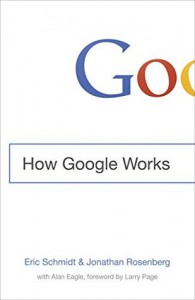To Google or not to Google: "How Google Works" by Eric Schmidt and Alan Eagle

Published September 23rd 2014
I had my first run in with Google in 2005 as a customer and maybe, because of that, I’ve read this book in a different light. Over the years I’ve found the Technology Giants experience sometimes incredibly frustrating (I won’t name any names in case you’re wondering). People who work with Technology on a day-to-day basis tend to look up to the Software giants with a stance of awe. I always get the sense they think there’s their way of doing things (insert here a Technology Company of your choosing) and then there’s the way of the rest of us… I quite agree with their take on the fact that one has to be super ambitious to get anywhere. I also see things the “Google way” when it comes to the importance of having a moonshot thinking, ie, we have to aim for the stars not to the hill next door. Most of the companies I know tend to assume that things are impossible, rather than starting from real-world physics and figuring out what’s actually possible. That’s the reason Google (and other American Technology companies) puts so much energy into hiring independent thinkers. If one hires the right people and have big dreams, one usually gets there. And even one fails, one will probably learn something important along the way.
On the other hand there’s a downside that comes from the fact that there is an absolute wall of arrogance and undeniable belief that their approach to every single problem is right, and if I’m too stupid to get that, they don’t need my business. I don’t tend to believe that they belong to an elite. In discussions with engineers, product managers, service managers and the like over the years, I found their arguments to be as weak as their listening skills.
In my first run-in with one of those so-called giants, the recruiter wanted me as a SysAdmin (I was working the Unix/Oracle/R3 side of things in a SAP R/3 team at the time); he said he had heard “great things” about my SysAdmin abilities and as well as about my understanding of how machines and systems interacted, not to mention my understanding of SAP R/3 processes and my programming skills, and on and on… Nothing came of it, mainly due to the fact that I had to go abroad and at the time that was not an option (it still isn’t). Some of the “techniques” I “suffered” on the 3 phone interviews were of the same caliber as the ones depicted in this book.
Google was one of the first companies to recognize the fact that there was a paradigm shift on the brink of showing up. It comprised three trends. To wit: the internet made the information free and ubiquitous; mobile devices and networking are really everywhere and continuous connectivity is also around us; cloud computing makes virtually infinite computing power, storage and applications available at everyone’s fingertips. I’m still uncomfortable with some of the approaches some companies are making regarding the latter, namely, again without naming names, some of the solutions in cloud computing can make a lot of people nervous because it moves the services off premise and places them in the cloud on another company set of servers and data centres. But that’s the nature of the beast.
This books fully illustrates everything that makes Google so omnipresent. We get to know what they mean by being a “smart creative”, “hippos”, etc. Unfortunately the book fails miserably when it comes to explaining what makes Google Google. The underlying thesis in the book seems to support the notion that a series of company’s characteristics are presented as being the reasons for Google’s success, but in my humble opinion, they are all corollaries of Google’s success and not the other way around. In my way of seeing things, Google’s success relies on the fact that it works in a market without any kind of opposition. If you dominate a market, money pours in. On top of that Google’s dominance is in a very profitable, high-margin ad business (with minimal cost of sales). By reading the book one gets the feeling there’s something truly innovating in the way Google does things. So, there’s some kind of misrepresentation here, whether intentional or not I’m not sure. Is this an attempt to re-write history? It would be interesting to read another take on the rise of Google not written by one of its founders.
Just saying. Really.
Another thing that annoyed the hell out of me was the use of the 3rd person. There was no “I” or “us”, which is weird since most of the funny notes (aka “jokes”) involved the authors. Was there a ghost writer at work here…?
NB: This book will always be special to me for a different set of reasons, because my third little gadget was born while I tackled Google’s intricacies. Will this youth generation be also a Google adopter or, by the time my boy is old enough, will there be something entirely different in the technological landscape? I’ve already buried this message in the ground to be dug up in 20 years’ time…
 1
1
 2
2



